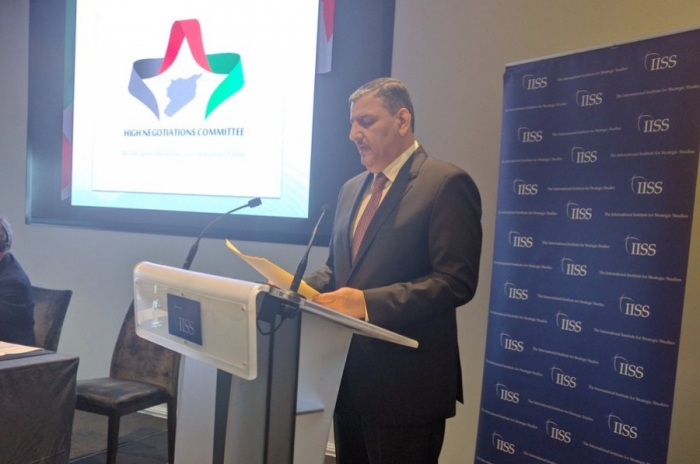The opposition High Negotiation Committee (HNC) on Wednesday unveiled a three-stage plan for a successful political transition in Syria based on the Geneva 2012 Communiqué.
The plan, dubbed “Executive Framework for a Political Solution,” was announced during a meeting of foreign ministers of the Friends of Syria Group in London where Syrian National Coalition President Anas al-Abdah is also taking part.
HNC General Coordinator Riyad Hijab described the opposition’s vision for a political solution in Syria as “dynamic” and one that aims to build “a political system that protects freedoms, safeguards individual rights, and that is founded upon the principles of liberty, equality, citizenship, and justice.” Hijab pointed out that the opposition’s plan will require serious will by the international community to force the Assad regime and its allies to respect the international resolutions.
The plan is composed of three phases that are set to last for two years during which Syria is to be transitioned to a new system of rule in accordance with UN Security Council resolutions 2118 and 2254.
As part of the first phase, the sides to the conflict are given six months to negotiate a peace deal, during which the Assad regime and the opposition forces must commit to a temporary truce. The phase also requires the immediate end to all combat operation, including aerial attacks, and lifting the siege on all towns and areas to allow humanitarian access. It also stipulates the release of detainees and disclosing the fate of all forcibly disappeared persons in prisons.
According the second phase, which is set to last for 18 months, a transitional governing body (TGB) will be established, which in its turn requires "the departure Bashar Assad and his clique who committed heinous crimes against the Syrian people."
A new constitution will also be drafted, with the TGB assuming full executive powers that include issuing a provisional constitutional declaration that shall be followed throughout the transitional period and establishing a caretaker government, a joint military council, a high constitutional court, a reconstruction commission and a national reconciliation commission.
The TGB powers should also include holding an inclusive national dialogue; restructuring the security apparatus; supervising the management of internal affairs and a local administration system based on the principle of administrative decentralization; ensuring the continuity and functioning of ministries, institutions, and public service bodies; combating terrorism; and working to get all foreign troops out of Syria.
The plan added: “During this period, a new political system shall be established based on a number of basic principles, including: the sovereignty, independence, and territorial integrity of Syria; a multi-party state based on freedom, democratic practice, inclusiveness, representation, and citizenship; the rule of law, human rights, and accountability, with effective mechanisms to ensure respect of human rights and dignity for all Syrians, and ensuring Syrians’ right to full participation in the political process. The Kurdish cause shall be considered a national Syrian cause and action shall be taken to ensure their ethnic, linguistic, and cultural rights in the constitution. There shall be an inclusive national dialogue launched with no exceptions or exclusions.”
The third phase would represent "a final transition through the implementation of the outcomes of the national dialogue and the constitutional revision." According to the HNC, during this last phase, local, legislative, and presidential elections would be held in Syria under the supervision and with the technical support of the United Nations.
This article was edited by The Syrian Observer. Responsibility for the information and views set out in this article lies entirely with the author.


